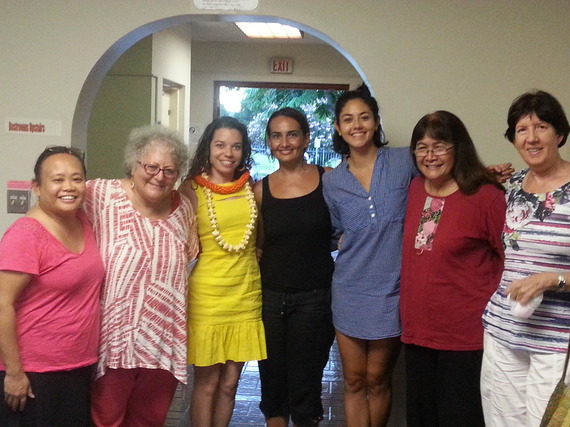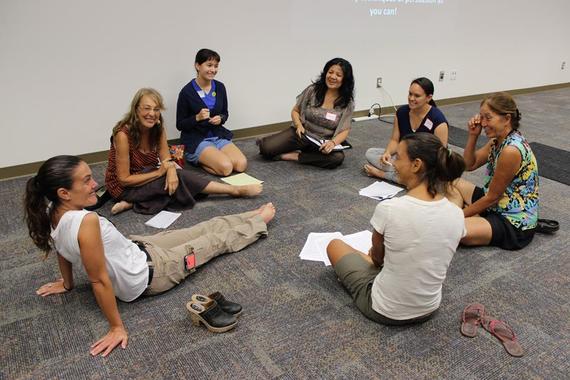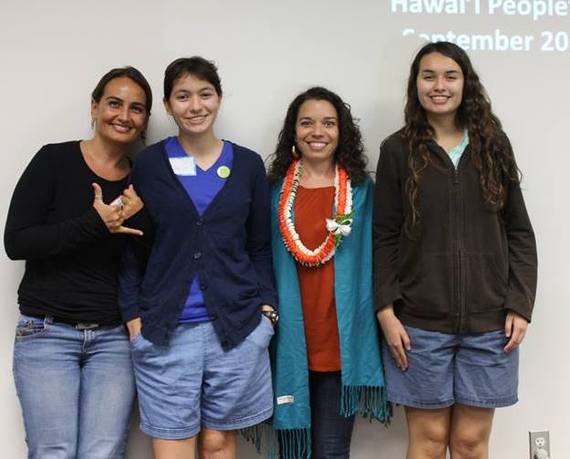Making haste has laid waste to some degree the notion of informed, responsible reporting. Every TV news anchor reminds you--repeatedly-- "you heard it here first." We are alerted first and foremost to the speed of the messenger, not to the depth of their analysis or the nuances of their reporting. Being "first" drives ratings, and ratings drives advertising--we all know that. But are we sufficiently alert to how money infects democracy through the media?
And, is it possible to get rid of the infection? Or at least temper its effects?
Darlene Rodrigues, Community Grants Program Coordinator for Hawaii People's Fund (HPF) offers one interesting idea: "Why don't we advocate for "slow media" the way we have advocated for "slow food?" Her suggestion emerged during a recent discussion with Andrea Quijada, Executive Director of the Media Literacy Project (MLP). The MLP's mission is to "transform people into critical media consumers and engaged media justice advocates who deconstruct media, inform media policy, and create media that reflect their lived experience."
Hawaii People's Fund invited Quijada to Honolulu to conduct a workshop for students and their mentors to build true media literacy--the kind that requires "looking beyond the frame" of the media message to examine its context.
Andrea Quijada, (in yellow) ED of the Media Literacy Project is seen here with Nancy Aleck (second from left) and Darlene Rodrigues (far left) of Hawaii People's Fund who arranged for a workshop in Honolulu. Also seen here (from extreme right): Barbara Polk, Evern Williams, Marika Emi and Vera Zambonelli.
The recent hysteria in the U.S. media, on the left and even more on the right, about ebola and the rush to offer theories and conclusions about "breaking news" on any front even as it is "breaking" has reached farcical levels. It is a good example of the desperate need for media literacy. More than ever, people need critical thinking skills to counter the media's increasing subservience to partisan politics, corporate interests and its willingness to turn tricks if it can make viewers tune in.
The response from both mentors and young students to Quijada's workshop in Honolulu and elsewhere reflects the growing desire for tools that will help cut through the mis-information overload and get to the heart of issues. 
Workshop participants had fun figuring out how to deconstruct the media
Vera Zambonelli is the founder and creative executive director of Hawai'i Women in Filmmaking, which collaborates with HPF to encourage young women to explore and pursue careers in the field of filmmaking. She found the workshop a very useful complement to the work she does to empower young women to find their voice and articulate their ideas. "Both the students and teachers who attended were equally skeptical about what the media delivers," she says. "Andrea gave them tools with which they could resist manipulation by the media by deconstructing what they see and by creating their own interpretations of issues," she added. "That is so important to making sure everyone has a voice."
Quijada was eloquent on the potential power of media literacy as a means to counter manipulation by powerful interests. "Becoming media literate is a pathway to social justice, to combating violence and listening to voices that are too often silenced by the megaphones of money and power. We become more alert to how military occupation silences indigenous voices. We become sensitive to the fact that the internet is not the great equalizer it is sometimes made to seem if the companies that support online services shrink from serving rural communities and concentrate on the profitable urban centers. Every time the FCC allows further consolidation of an already over-consolidated industry in which a handful of companies determine which publics get served or how accessible and efficient services are for different groups, our democracy as a whole suffers," said Quijada.
Would you put "net neutrality" on your list of things you worry about today? Probably not. And yet the threat of being treated like second-class citizens if "net neutrality" is undermined is a real one for ordinary people. And most aren't paying attention. Poor voter turnout is one indicator of the lack of attention that could allow those politicians who serve as proxies for corporate interests to push their agendas.
"Out of Network" on the MLP website provides multiple examples of the convenience and opportunities high speed internet and easy online access offer urban communities routinely compared to the difficulty and cost to marginalized minority or rural communities that companies are disinclined to serve. "By creating a high-speed Internet that only some people can access and not all people, and giving others dirt roads, that's discrimination," says Quijada.
Ten Paths to Media Literacy
The MLP website lists ten ways people can fight back.
1. Develop critical thinking skills
2. Understand how media messages shape our culture and society
3. Identify target marketing strategies
4. Recognize what the media maker wants us to believe or do
5. Name the techniques of persuasion used
6. Recognize bias, spin, misinformation, and lies
7. Discover the parts of the story that are not being told
8. Evaluate media messages based on our own experiences, skills, beliefs, and values
9. Create and distribute our own media messages
10. Advocate for a changed media system
What Quijada taught the group to do with commercials--taking them apart and reconstructing their own--is a process that can, and should be applied to the news too. Junk information is as bad for our mental health as junk food is for our bodies. The deterioration in the role the media plays in ensuring an informed, engaged citizenry is real.
Three Cheers for Media Literacy
Becoming media literate can be enormously helpful in fighting ignorance and building a better democracy. It can help combat extremist religious activities and conservatism tinged with homophobia, racism and misogyny. Media literacy should make us determined to vote. Because, as E.M. Forster pointed out, democracy isn't a perfect system but it deserves two cheers because it is the only system that admits variety and permits criticism. As for media literacy, I say it deserves three cheers: it teaches us to decipher motivations, question the messenger and follow the money.
Visit the Media Literacy Project to learn more about its curriculum offerings and programs that can help empower a new generation to think critically and work for social justice.

